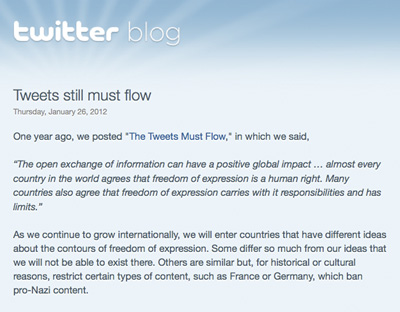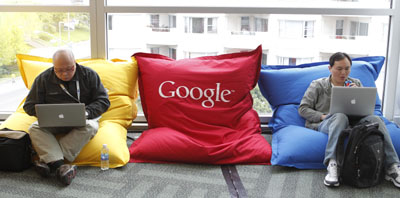What’s behind India’s Internet censorship?
We have been posting a lot about the challenges facing the Internet in India recently–see Mannika Chopra’s “India struggles to cope with growing Internet penetration.” On Tuesday, Angela Saini, a guest blogger on The Guardian’s Comment Is Free site, posted “Internet censorship could damage India’s democracy,” with the subhead “Google and Facebook have been asked…

Can selective blocking pre-empt wider censorship?
Last week, Twitter provoked a fierce debate online when it announced a new capability–and related policy–to hide tweets on a country-specific basis. By building this feature into its website’s basic code, Twitter said it hoped to offer a more tailored response to legal demands to remove tweets globally. The company will inform users if any…
Google+, real names and real problems
At the launch of Google+, Google’s attempt to create an integrated social network similar to Facebook, I wrote about the potential benefits and risks of the new service to journalists who use social media in dangerous circumstances. Despite early promises of relatively flexible terms of service at Google+, the early days of implementation were full…

India struggles to cope with growing Internet penetration
As Internet penetration deepens, largely religiously and socially conservative India is struggling to cope with concerns about controversial web content and its easy accessibility to a vast population, all with little oversight. Local courts have become the launching point for some of the anti-Web offensives.
Policing the Internet in India
Amid a raging debate on Internet freedom and censorship in India, members of the government met last week with a clutch of website operators, including representatives of Yahoo, Google, Facebook and Microsoft. In a meeting scheduled to address a wider plan to leverage social media to empower the government, it’s unclear whether the touchy subject…
Catching the Internet’s spies in Iran and elsewhere
In August, Google introduced a new, if rather obscure, security feature to its Chrome web browser, designed to be triggered only under extreme circumstances. If you were talking to Google’s servers using the web’s secure “https” protocol, your browser makes a number of checks to ensure that you are really talking to Google’s servers. Like…

Security vs. risk: More on Facebook and Google+
It’s been fascinating watching the hothousing of a new social network in Google+. In the early days of Twitter, it was the users who invented social norms like “@”ing people, hashtags, and retweeting, which the designers of Twitter adopted and echoed in thee hardwired code of the website itself. Such affordances, as they are known,…

Google+ for journalists at risk
When they’re creating new features, software designers talk in terms of “use cases.” A use case describes steps that future customers might perform with a website. “Starting a group with friends,” would be a use case for Facebook. “Buying a book” would be case for Amazon’s designers.
Is China censoring phone conversations?
Are Chinese mainland citizens, as has been reported, finding their telephone conversations cut off whenever they mention the word “protest?” While large-scale, real-time voice recognition is a technological possibility, it is at the edge of what is believed likely. It would certainly be revealing about the capabilities of the Chinese government if these anecdotes proved…